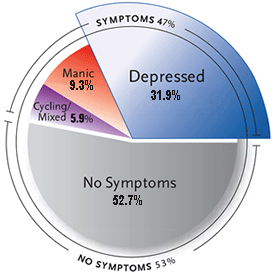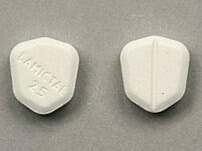It is critical to understand medication for bipolar depression.
Why is treating bipolar depression so important?
As the chart shows, people with bipolar disorder typically spend much more time suffering from episodes of bipolar depression.
3 (depressive symptoms are more common in bipolar disorder than manic/hypomanic)
Episodes of bipolar mania are relatively rare for many people.
Study the chart on bipolar symptoms (below right) carefully.

This chart explains many misunderstandings about bipolar symptoms.
For example, bipolar depression symptoms are over three times more common than bipolar mania.
There are two misconceptions that must be clarified:
1
1. Bipolar disorder is primarily about manic symptoms.
2. Bipolar medications address the full spectrum of bipolar symptoms.
In reality there are very few true mood stabilizers that address BOTH depression AND mania.
These mood stabilizing bipolar drugs tend to be used for long term maintenance in order to prevent mood swings, or at least reduce the frequency, duration and severity of episodes of mania or depression.
The FDA-approved mood stabilizers are very few.
Reminder
There is no single best medication for bipolar depression.
So far this group of bipolar drugs for BOTH mania AND depression includes only:
1. Lithium
2. Lamictal
3. Zyprexa.
Most of the other medications we associate with treatment of bipolar disorder are in fact quite distinct and effective against ONLY bipolar depression OR bipolar mania
For example, risperidone (Risperdal) and ziprasidone (Geodon) are atypical anti-psychotics that are usually prescribed for controlling manic or mixed episodes, whereas in 2006, Seroquel became the first atypical anti-psychotic to receive FDA approval for the treatment of bipolar depressive episodes.
Seroquel is now a first line agent in treating bipolar depression.
In July 2013 there was a big step forward when Latuda was also approved by the FDA as a bipolar depression medication as Latuda has much milder side effects than Seroquel, and is now also considered a first-line agent in treating bipolar depression.
In reality there are very few true mood stabilizers that address BOTH depression AND mania.
Learn more about bipolar depression medications.
Best bipolar depression medications
There is no single best medication for bipolar depression.
Individuals all respond differently so it is not possible to make any definitive statement.
In general, well regarded bipolar depression medications that will usually be effective against depressive bipolar symptoms and whose use is supported by good clinical evidence include:

1. Lamictal
2. Latuda
3. Seroquel
4. Antidepressants – Fluoxetine (Prozac), paroxetine (Paxil), sertraline (Zoloft), and bupropion (Wellbutrin) are examples of antidepressants that may be prescribed to treat symptoms of bipolar depression.
Although there is no definitive “best” bipolar depression medication, there are established treatment guidelines from the experts that suggest some bipolar drugs should be front-line (treatments of first resort) medications in cases of bipolar depression.
For example:
1. The American Psychiatric Association (APA) suggest:
“The first-line pharmacological treatment for bipolar depression is the initiation of either lithium or lamotrigine (Lamictal). Antidepressant monotherapy is not recommended.
As an alternative, especially for more severely ill patients, some clinicians will initiate simultaneous treatment with lithium and an antidepressant.”
2. According to The Expert Consensus Guidelines:
“A combination of medication and psychotherapy is recommended for bipolar depression. The doctor may also use medication alone at first, especially if the person has severe or psychotic depression and finds it hard to participate in therapy.
Milder depression can usually be treated with lamotrigine or lithium alone. Combination treatment with lithium plus an antidepressant or lamotrigine may be needed for more severe depression.
For psychotic depression, an atypical anti-psychotic is usually combined with an antidepressant, lithium, or lamotrigine. Antidepressants should always be given with a mood stabilizing agent in bipolar disorder to avoid triggering a manic episode and should be avoided if possible in rapid cycling patients.”
3. The Texas Medication Algorithm Project (TMAP) bipolar disorder algorithms suggest that medications for bipolar depression be tried in the following sequence:

- Start with lithium or another anti-manic. If lithium is insufficient, add Lamictal.
- If no history of mania, start with Lamictal.
- If there is no response, start quetiapine (Seroquel) or a olanzapine/fluoxetine combination (i.e Symbyax).
- If there is no response try a combination of lithium, Lamictal and/or Seroquel, OR Symbyax.
- The sequence continues until all drug options are exhausted, along with ECT.
Overview of bipolar drugs

In summary, medication for bipolar depression comes in several types of bipolar drugs that to a greater or lesser extent target the depressive pole of bipolar symptoms.
The mood stabilizers:
First and foremost lithium, although some anticonvulsant drugs (originally developed to treat epilepsy) also have mood stabilizing properties. For example, Lamictal, Depakote, and Tegretol.
Antidepressants:
These can include SSRIs such as Prozac, SNRIs such as Effexor, and other well known antidepressants such as Wellbutrin.
The key point is that these conventional antidepressants should not be used to treat bipolar depression unless used in combination with a med that is a mood stabilizer or an anti-manic agent.
This is because antidepressants on their own can cause a switch into the manic state.
Atypical Anti-psychotics:
These are second generation anti-psychotics with different (and supposedly more benign) side effects than the original anti-psychotic medications. Some, such as Geodon are anti-manics, while others, such as Seroquel and Latuda have an antidepressant effect.
Some atypical anti-psychotics such as Zyprexa are approved as maintenance treatments for bipolar disorder.
2
Main takeaway:
NOT ALL BIPOLAR DRUGS ARE PROVEN TO BE AN EFFECTIVE MEDICATION FOR BIPOLAR DEPRESSION.
 Medically reviewed by
Medically reviewed by 
4 Comments
Thank you
After one episode of me showing supposedly signs of being “manic”. My doctor took me off my ADHD (which was just changed the day before this incident from adderall, a medication I’ve been on for years and was doing fine on, to vyvanse). I was upset because the same day she changed my medicine to vyvanse she also changed my son’s ADHD medicine to the same thing just a lower dose and his first day on it he had a horrible day at school so much I ended up having to go get him. I had already told her I wasn’t too sure about him being on vyvanse because he was once on it at too high of a dose and from then on we’ve stayed away from it. So yes him having the day he had I was very upset when I went to see her. Also informed her I didn’t feel like the medication was doing anything for myself. That’s when she said I was showing signs of being manic and stopped any ADHD medicine and started me on lamictal. I feel she over judged the situation. She also with no reason I can think of took me off my Zoloft and switched it to paxil. All the same day that she changed my adhd meds. She told me I wouldn’t experience any withdrawals from stopping the adhd medicine suddenly and going to lamictal. I know that is not true. I feel she isn’t listening to me or has already passed some judgement towards me. I want ALL my original medications back and to see a different doctor. Does anyone have any input or thoughts on this. Am I over reacting or does it seem like she’s just playing around with my medicine I’ve been on for close to 5 years?
I take ADHD MEDS mom of 3 girls, I also take Prozac. Either it’s my age or I’m just going crazy but I feel , always have felt manic! No in between for me:( I also have issues with medication causing weight gain. If it has that side effect I will not take it
During my first hospitalization, I was diagnosed with hypothyroidism. After a couple of years of treatment and therapy, I was diagnosed as bipolar. That was in the mid 90’s. I have been on thyroid medication since then and on Lamictal for the most of the time. After much insistence with my primary care doctor and numerous blood tests, I have recently been diagnosed with Hashimoto’s disease. In Hashimoto’s, the body produces antibodies which attack the thyroid creating an instability in the release of the hormones produced by the thyroid. I feel this has probably been the problem all along. Any thoughts?